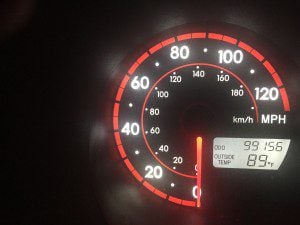A guest post by Lee Hull Moses
Sometime this summer, my car, a Matrix hatchback in a deep blue color I’ve always loved, is going to pass the 100,000 mile mark. I’ve been watching the odometer creep closer with some anticipation, as if the car is approaching a major birthday that should be marked with fanfare and celebration.
 I realize it’s silly and a bit cliche to get sentimental about a car. Surely it’s nothing more than a hunk of molded plastic and steel that costs more more in gas and maintenance than I care to calculate. To reminisce about the life of one’s car is the stuff of television commercials carefully designed to get me to buy another one.
I realize it’s silly and a bit cliche to get sentimental about a car. Surely it’s nothing more than a hunk of molded plastic and steel that costs more more in gas and maintenance than I care to calculate. To reminisce about the life of one’s car is the stuff of television commercials carefully designed to get me to buy another one.
But the truth is that this car’s been around awhile now. It was the first car we bought together, not long after we’d gotten married, when we were making our way in a new city, both of us with real, grown-up jobs for the first time. That car has taken us on adventures from mountains to coast, and countless trips to the grocery store. It’s driven nearly all of I-95 at one time or another, from Florida to Maine.
That car brought both our babies home from the hospital. With the first one, I sat in the back, hovered nervously over the carseat, hormonal tears flowing all the way home. With the second baby, I sat in the front, more confident if no less hormonal.
I’ve wept in that car and laughed in that car. Fought with my husband in that car. Made up with my husband in that car. (Not made out. The car is too small and we’re too old.) Sang my heart out in that car. Driven with one hand on the steering wheel and my other arm twisted behind me reaching for dropped toys and pacifiers. Hidden out in the corner of a fast food restaurant parking lot, sneaking a chocolate milkshake before I had to pick up the kids.
When we finally gave in and replaced our much older clunker with a minivan, the Matrix got demoted to second-best car, but it’s still my favorite. I felt a little sorry for it the first time we left for a road trip in the van and left it sitting alone in the driveway, like we’d betrayed it after years of faithful service.
When my parents bought my first used car so they could stop driving back and forth to bring me home from college, among the advice my dad gave me – including a reminder to always wear my seatbelt and get regular oil changes – was this: Use it to help people.
I can’t say I’ve done that all that often. The vast majority of those nearly 100,000 miles have been for purely personal gain. But on occasion, like last Saturday, when I loaded the back full of vegetables from our church garden to be donated to a food bank in town, I think of that advice.
Sure, it’s just a car. It’s just another thing I own. Everywhere I look these days, people are decluttering and simplifying. That’s a good thing; we’re slowly acknowledging that our possessions don’t define us, that accumulation of goods can get in the way of a well-lived life. But we who practice an incarnational faith know that our lives are lived in these bodies, on this earth, with this stuff. Our clothes, our toys, our gear – it’s not just meaningless stuff. It’s how we live our lives. Our stuff matters and is worthy of delight.
And yes, we should walk more and use our cars less. I should be putting off that mileage mark as long as possible. But the reality of my life right now is I’m going to have a car. So I’m going to take good care of it, and be grateful for it, and use it for good when I can. And maybe I’ll throw a little party to mark the occasion when the odometer clicks over to all those zeros.
Lee Hull Moses hardly ever writes about cars. She’s the co-author of Hopes and Fears: Everyday Theology for New Parents and Other Tired, Anxious People, and a new book on living faithfully with abundance, to be published next year. She lives in Greensboro, North Carolina, where she serves as the pastor of First Christian Church (Disciples of Christ). Connect with her at www.leehullmoses.com.












